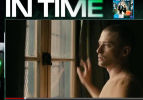The rich as thieves of time: Review of In time - the movie and Time Bomb - the book

 We are all here for a limited time, but when we have to work harder and harder to stay in one place, that is not really living. Who is stealing our time? Were it not for the cost of housing, Australians would need to work only half the hours they have to and manufacturers would halve their costs! We have only to consider how, in two generations, Australians have gone from needing one income to purchase a house to a situation where both spouses must work and pay for others to bring up any children they may find a brief instant to produce. The writer reviews two works on time-poverty: one a heavyweight and the other a lightweight and remarks that time is money. Time is life. See the film or watch the trailer; feel the truth: spot the enemy.
We are all here for a limited time, but when we have to work harder and harder to stay in one place, that is not really living. Who is stealing our time? Were it not for the cost of housing, Australians would need to work only half the hours they have to and manufacturers would halve their costs! We have only to consider how, in two generations, Australians have gone from needing one income to purchase a house to a situation where both spouses must work and pay for others to bring up any children they may find a brief instant to produce. The writer reviews two works on time-poverty: one a heavyweight and the other a lightweight and remarks that time is money. Time is life. See the film or watch the trailer; feel the truth: spot the enemy.
Pocock et al Time Bomb book disappointingly shallow
I rushed out and bought Barbara Pocock, Natalie Skinner and Philiippa Williams' book, Time Bomb, NewSouth, NSWU Press, 2012, because it seemed like such a great title and subject. I should have been warned off by the fact that it was recommended by Geraldine Doogue, a great apologist for growth and economic neo-liberalism.
Disappointingly, Pocock et al's book fails to make some blindingly obvious points. It phaffs around the edges. I wonder if the authors simply did not see beyond the superficial or they thought that the publishing market could not take the heat. Are they somehow placed in the eye of the storm where all is quiet whilst the damage rages all around them. The book is published by the University of New South Wales, which makes me wonder again why universities these days turn out such dross. Is polite comment and a few boring graphs a prerequisite for a doctoral thesis these days? What's the market? The anguished New Class?
Could be.
What really got to me was the fact that the authors don't ever link the ridiculously rising cost of living to the time-poorness of Australians. They don't even mention the cost of housing, which is easily the greatest thief of time. Okay, they give two pages (pp. 130-131) to the idea that 'for a minority of young people, housing is a significant issue.'
Housing is the Number One issue! Were it not for the cost of housing, Australians would need to work only half the hours they have to and manufacturers would halve their costs! We have only to consider how, in two generations, Australians have gone from needing one income to purchase a house to a situation where both spouses must work and pay for others to bring up any children they may find a brief instant to produce. And then there are the other Australians, who live on the streets, sell drugs and beg on trains to survive.
Why do people publish this kind of much ado about nothing? Are they just marketing titles at airports which people buy, read the first chapter of, and bin on their way out of the arrivals door?
In Time - the movie - very deep, very true, very intelligent
In contrast, the movie In Time was a (for lack of a new word) brilliant dramatization of how the parasitic rich are thieves of time and that life is measured out in money. In Time is about a world just like ours where the poor die young and spend their precious lives hanging around begging for work or for credit from a rarer class of landlords by any other name that owns the means of production and all the assets.
"Four minutes for a cup of coffee? Yesterday it was only three!" a customer exclaims in a down-market take away shop.
Time is money. Money is time. Time is life.
People might recognise the metaphor more easily if the short-lived class were from the traditional poor and overcrowded countries but the poor in this film are mostly unremarkable by their colour or their accent. They could be Americans, Australians, Canadians, British. The wealthy live almost indefinitely in this film, while the poor must pay by the hour for their lives after the age of 21. Most people accept an ideology called the Demographic Transition where peoples of 'undeveloped countries' are supposed to normally not live past 35 or so, until 'we' bring development to them. So if the film had been made on the edges of the Ganges River, perhaps no-one would have been startled. But this was a film about the future that many candobetter readers would recognise as Now. In Australia.
This is a short article because I don't have much time - frankly. Maybe readers can add to this with their experiences and their responses to In Time.

Recent comments